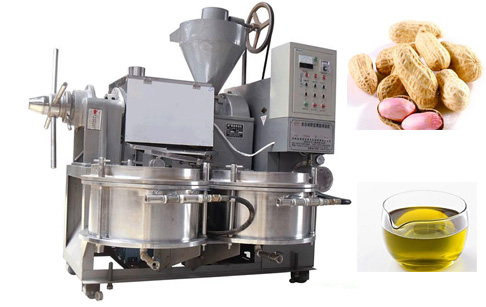
Oil press is widely used in rural areas of our country. It is used to squeeze oil from oil crops such as peanuts, soybeans, cottonseed and rapeseed for food, and its residue can be used as feed and fertilizer. The Yuantong screw oil press has a compact structure and a small footprint. Hydraulic oil press covers a large area, consumes less power, and has better oil cake quality.
The influence of squeezed material structure properties on oil output:
(1) The more damaged cells in the squeezed material, the better, which is conducive to oil production.
(2) The size of the squeezed material particles should be appropriate. If the oil particles are too large, it is easy to agglomerate and close the oil circuit, which is not conducive to the oil output; if the oil particles are too small, it is also not conducive to stabilizing the oil output, because the squeezing force will take away the oil during the squeezing process, increasing the oil flow resistance, and even Block the oil circuit. At the same time, the oil particles will increase the plasticity of the squeezed material, resulting in poor cake delivery or even jamming.
(3) The bulk density ratio of the pressed oil is as large as possible without affecting the internal and external structure of the oil, which is beneficial to the increase of the processing capacity of the pressed oil of the oil press.
(4) The pressed oil must have proper moisture and good fluidity. Before the squeezed material enters the hopper of the oil press, it is necessary to maintain an appropriate temperature suitable for pressing, and at the same time, minimize the viscosity and surface tension of the oil in the squeezed material to ensure that the oil maintains a good oil output during the entire pressing process.
(5) The squeezed material particles have sufficient plasticity. The plasticity of the squeezed material must have a certain range. On the one hand, it cannot be lower than a certain limit to ensure that the oil has a fairly complete plastic deformation to form a cake; on the other hand, the plasticity of the oil cannot be too high. Otherwise, the squeezed material is not easy to form high pressure due to its high fluidity, and the phenomenon of "oil flowing out of the cake outlet" will occur when the oil is squeezed.
The nature of the squeezed material:
(1) Moisture content: As the moisture content increases, the plasticity gradually increases. When the moisture reaches a certain point, the squeezed oil is in good condition. Once this content is slightly exceeded, it will produce a very violent "extrusion" phenomenon, that is, "mutation" phenomenon. On the other hand, if the water content is slightly lower, the plasticity will suddenly decrease, and the particles will be loosened, which is not conducive to oil extraction.
(2) Temperature: Heating the squeezed material will increase the plasticity; when the squeezing material is cold, the plasticity will decrease. During pressing, if the temperature drops significantly, the oil particles will not have good binding properties, so the cakes at the outlet are loose and difficult to shape. However, the temperature should not be too high, otherwise certain substances will be separated into gas or burnt smell due to the high temperature. Therefore, heat preservation is one of the important conditions in the pressing process.
(3) Protein denaturation: it is necessary to extract oil by pressing method. However, excessive denaturation of protein will reduce the plasticity of the squeezed material, thereby increasing the "extrusion" pressure of the oil press, which is opposite to the effect of increasing moisture and temperature. Whether the protein in the squeezed material is fully denatured or not is a measure of the degree of damage to the colloidal structure in the oil. During squeezing, due to the combined effect of heating and high pressure, the protein will continue to be denatured, but inappropriate temperature and pressure will cause excessive denaturation, which is also not conducive to oil production. Therefore, the denaturation of oilseed protein can neither reduce the plasticity of oilseeds due to excessive adjustment, nor can it affect the oil yield and edible quality of oils due to insufficient oil denaturation. If the oil still contains undenatured colloidal substances, it will affect crude oil refining.
Copyright © Henan Zhongxing Grain And Oil Machinery Co.,Ltd. All Rights Reserved. Powered by MetInfo